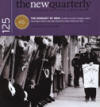The New Quarterly – Winter 2013
How could one resist picking it up! Who, after all, could resist such a title? “The Disquiet of Men: in which we skirt tragedy, watch marriages wither, and seek direction while riding the rails.”
How could one resist picking it up! Who, after all, could resist such a title? “The Disquiet of Men: in which we skirt tragedy, watch marriages wither, and seek direction while riding the rails.”
If you didn’t know that The New Quarterly is an impressively supported—for the quality of its work—journal (see the listing of organizations from the arts, universities, community foundations, and preservationists), then you would still be attracted by the subtitle for this issue.
The editor’s introduction sets the tone with an impressively written definition of the theme and a content summary. And the first piece, Zachariah Wells’s “A Walking Shadow,” takes us into the theme with a detailed description of an alcoholic’s stupor, a writer’s mindset, and the memories of anyone who has had to recreate themselves and their relationship with their father.
Well’s piece and Jeffery Donaldson’s “I Stand Before You: Museums, Galleries, and How To Find Yourself in Them” are my favorites, ignoring my preference for nonfiction. It’s the thought in each that appeals, both in reflection and re-creation of self. Donaldson writes, “I am mystified by daily life. I don’t understand what it is. Our stubborn ordinariness, how we live with it, how we embody its routines, its compromises and dulling seductions. . . . We disappear, like pictures hung too long on the same wall.”
Don’t misunderstand; the poetry and fiction are excellent. This is not a philosophy text, but the theme holds true: “The Disquiet of Men.” I believe women will as readily identify with the specific tales, for surely the theme is universal. The message is certainly there. Try “When Genghis Khan Was My Lover” by Susan Young: “Months passed, then years. A string of miscarriages. Batteries of tests, then, finally, a technical diagnosis that might have afforded relief if it weren’t so laughable—inconclusive blame.”
It’s appropriate for Young’s piece to be in a section titled “Three Additional Delights from our Fiction Contest.” And they are. Andrew Forbes’s “The Rate at Which He Fell” echoes the lessons of decision making we all experience. Kari Lund-Teigen’s “Down to Here” provides the third perspective on relationships and the tedium that wears on them.
A woman’s perspective of tragedy and tedium are obvious in Katherin Edwards’s three poems, but they are not limited to only a woman’s or man’s view. They all echo the old adage that “anyone can be a hero; living one day at a time is the real test of courage.”
There’s a message in the humor; try Stephen Kroll’s “The Man Who Dealt Well With His Big Head.” There’s sadness in many of the pieces, but “pathos” would be accurate.
This collection isn’t for the young or those inexperienced in life. The empathy and sympathy come with a recognition of life’s events, both individual and collective. It’s the disquiet of us all.
[http://www.tnq.ca/]





